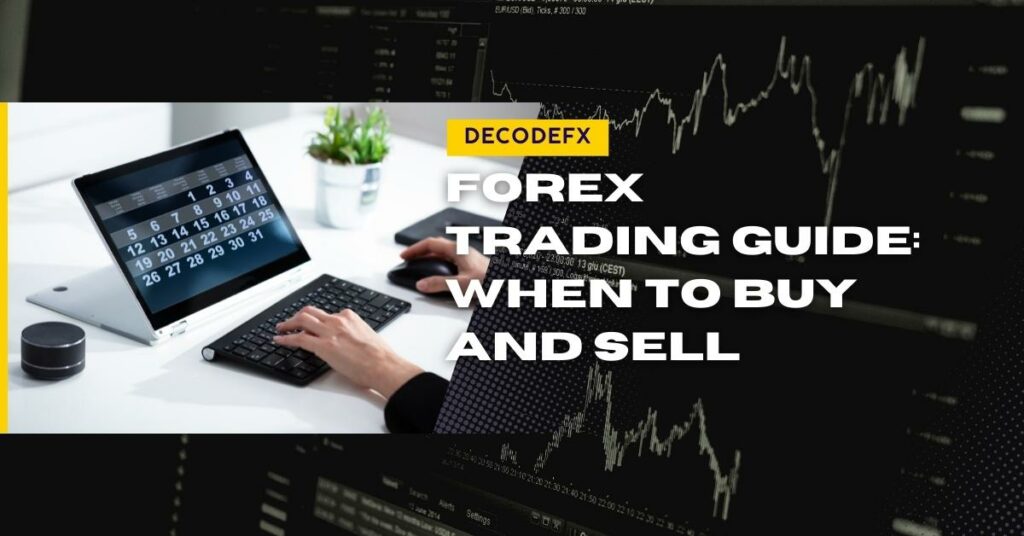As a forex trader, you can either buy, sell or stay out of the market. Knowing when to buy or sell a currency pair is critical to your success as a trader because it helps you to recognize and take advantage of trading opportunities as they appear. If you want to learn how to determine whether to buy or sell a currency, then keep reading this article to the end.
What is buying and selling in the Forex market?
Buying a currency is also called going long. You’re purchasing that currency because you have reasons to believe that it will increase in value during a specific period. If you’re trading on a brokerage platform, the currencies will be traded in pairs. The first is the base currency, while the second is the quote currency. You have to buy one and sell the other simultaneously. If you have a pair such as EUR/JPY, the euro is the base currency, and the Japanese yen is the quote currency.
Therefore, if you buy the EUR/JPY pair, you’re buying the euro and selling the Japanese yen. This means you believe the euro will appreciate in value.
Selling a currency is also called going short. You’re selling that currency because you have reasons to believe its value will decline during a specific period. If you sell a currency pair like EUR/JPY, you’re selling the euro and buying the Japanese yen simultaneously. This shows you believe the euro would weaken against the Japanese yen during a specific period.
How does buy and sell work in forex?
The buying and selling system depends on the type of forex market being traded. There are three types of the forex market; spot markets, futures, and forward markets.
Spot Forex Market
The spot forex market provides a medium for traders to exchange currencies at the current exchange rate immediately. Most retail traders love to trade the spot market and exchange currencies via a trusted and regulated broker. Banks, hedge funds and financial institutions also carry out spot trading by exchanging different currencies instantaneously at the current market prices.
Forward Forex Market
If you’re trading the forward forex market, then you can buy and sell via forward contracts. A forward contract involves two parties who decide to exchange a currency at a specific price and time. The parties can be individuals, companies or even governments.
Futures Forex Market
Futures contracts are similar to forward contracts, except they’re facilitated by exchanges. This makes them more liquid than forward contracts.
Generally, it would help if you bought strong currencies and sold weak ones, regardless of the type of forex market you’re participating in.
How to Buy and Sell in Forex Trading
If you want to buy and sell in forex trading, then follow these five steps;
1 Decide How You Want to Trade
You can buy and sell through various methods, as discussed above. Before risking your capital, you should learn the details of the style of trading you wish to adopt. If you need to trade with futures contracts, for instance, you should learn how futures exchanges work.
2 Educate Yourself
After deciding your preferred approach to trading, you need to educate yourself on the basic forex trading concepts. These foundation concepts are critical to your success and would help you to grow and understand other advanced forex concepts. You can learn concepts like pips, lot size, spread, leverage, limit orders, etc.
3 Learn a Profitable Forex Trading Strategy
As a trader or investor, you need a profitable strategy to make consistent profits from trading. There are various strategies to choose from, and most of these can be learned online. From free and paid courses to YouTube videos and lessons, there are many ways to learn profitable trading strategies. You can learn investment strategies from video lessons, ebooks, and many other resources.
4 Create a Trading Plan
A trading plan is essentially a manual that directs and governs your trading decisions. It specifies the rules that guide your decisions – trade entries, trade execution, and management. Some may specify the exact hours of the day during which trades can be executed. The goal of creating a trading plan is to help you make better trading choices by preventing emotional trading decisions and giving you a rule+based approach to buying and selling.
5 Open a trading account
Once you have a profitable strategy and a trading plan, you can open a trading account on a brokerage platform and begin to execute your trades.
When You Should Buy and Sell in Forex Trading
Three factors influence when you should buy and sell in the forex market;
1 Trading Hours
The forex market never stops moving because the various trading sessions overlap. This keeps the market open 24 hours a day for the five working days of the week. However, not all trading hours are favorable for trading. It would help if you tried to trade during volatile trading sessions. This would ensure that the market volatility and liquidity are sufficient for your trades to be executed and managed easily.
2 Technical Analysis
You can use technical analysis to determine the best time to buy or sell. This involves the analysis of price charts using forex indicators, chart patterns, and other trading theories to predict when to execute trades. There are various analysis tools, including; support and resistance, Elliot waves, smart money concepts, and a plethora of forex indicators. You can use these to determine when to enter or exit trades and the best ways to manage your trades.
3 Fundamental Analysis
Fundamental analysis involves the analysis of the world news, and economic and financial data, with a view to determining their impacts on currency prices. This involves a crucial and exhaustive comparison of interest rates, economic growth, political stability, and other factors that affect the supply and demand of various currencies.
When You Should Not Trade the Forex Market
1 During High Impact News
High impact news like interest rate announcements, non-farm payroll, and consumer price index data are characterized by highly unpredictable price movements and volatility spikes. Attempting to trade these random price fluctuations leads to a capital loss in most cases.
2 Bank Holidays
Bank holidays lead to a significant reduction in the liquidity and trading volume in the forex market. This is because banks and financial institutions are responsible for a large proportion of the liquidity being used in forex trading. The low trading volume on holidays results in an unpredictable market with low volatility. This makes it difficult to make profits and can be a waste of mental capital.
3 Low-Volume Trading Hours
Some trading hours, like the end of the New York session(the end of the trading day), typically have low volume and volatility. As the market closes for the day, there is a high likelihood that gaps and slippages will occur. Gaps can lead to a loss of capital, which often makes trade management very difficult. A gap can cause the price to ‘jump’ over your stop loss or take profit. Therefore, the beginning and end of a trading day aren’t the best times to trade.
Essential Factors to Consider When Buying and Selling in Forex
Here are four factors to consider when trading currencies;
1 Market Trend
Unless your strategy is purely a counter-trend strategy, try to trade in line with the market trend at all times. This could help to increase your win rate because pro-trend trading is generally considered safer because it’s a straightforward approach.
2 Micro and Macroeconomics
As discussed earlier, fundamental analysis and examination of economic data help you understand the market environment and make optimal trading decisions. Fortunately, the release times for most of these reports are released beforehand – usually at the start of the trading week.
3 Your Trading Capital
Before trading, make sure your position sizes and risk percentages are a small portion of your trading capital. This helps you develop discipline and prevent emotional attachments to the executed trades.
4 Your Trading Plan
Clicking the ‘buy’ or ‘sell’ button can be tempting…euphoric even. But, it would help if you had a checklist of factors that should be in place before you click that button. This checklist is part of your trading plan and ensures that you follow your trading rules.
Start buying and selling in forex trading with Decode Global
Once you are ready to trade the currency market, ensure all your trades are executed on a regulated trading platform. Trading with a broker that has low spreads and favorable trading conditions helps you to make the most of your strategy and make profits consistently.

